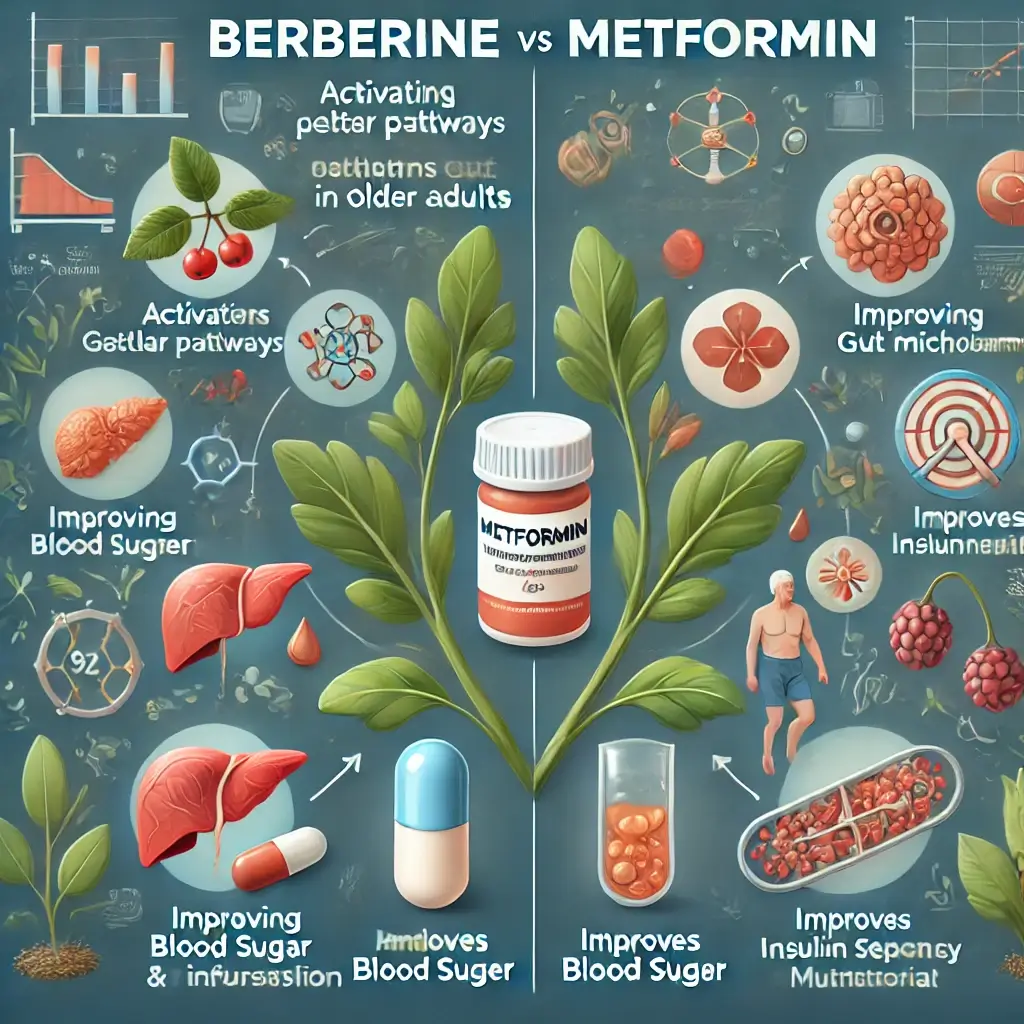Introduction to Blood Sugar Management in Seniors
For adults over 60, managing blood sugar levels effectively is crucial to maintaining overall health and preventing complications like diabetes, cardiovascular disease, and cognitive decline. With the aging process often leading to a natural decline in metabolic efficiency, understanding the best interventions for blood sugar control becomes a priority. Among the most widely discussed options are Metformin, a pharmaceutical mainstay in diabetes management, and Berberine, a natural compound derived from various plants with a rich history in traditional medicine. Both have demonstrated efficacy in improving glucose metabolism, but their mechanisms, applications, and potential side effects vary significantly.
Natural Alternatives and Traditional Medicine
The appeal of Berberine has grown as seniors seek natural alternatives to traditional medications, particularly those aiming to avoid side effects associated with pharmaceuticals. In contrast, Metformin remains a gold standard due to its extensive research and proven outcomes. This article explores the nuances of these two approaches, offering insights into their respective benefits, mechanisms of action, and considerations for use in older populations. Moreover, it examines complementary natural strategies for managing blood sugar levels in those over 60, highlighting the importance of an individualized approach to healthcare.
Mechanisms of Action Comparison
Berberine
Activates AMP-activated protein kinase (AMPK), which improves insulin sensitivity and promotes glucose uptake by cells.
Regulates glucose transporters, enhancing the body’s ability to move sugar from the blood into cells.
Modulates the gut microbiome, fostering an environment conducive to better glucose regulation.
Reduces inflammation, a common contributor to insulin resistance.
Metformin
Primarily reduces hepatic glucose production, lowering overall blood sugar levels.
Enhances insulin sensitivity, particularly in peripheral tissues like muscles.
Influences the gut microbiota, with emerging research suggesting this plays a key role in its effectiveness.
Modulates mitochondrial function to improve cellular energy metabolism.
While both compounds influence blood sugar through overlapping mechanisms, their origins and pharmacokinetics differ, with Metformin being a synthetic pharmaceutical and Berberine a natural alkaloid.
Clinical Evidence and Applications
Studies show Berberine and Metformin can similarly lower fasting blood glucose and HbA1c levels. For example, research by Anderson et al. (2023) concluded that Berberine administered at 500 mg two to three times daily was comparable to Metformin at 500-1000 mg daily in managing glucose in older adults.
Berberine offers additional benefits, such as lipid profile improvement and anti-inflammatory effects, making it suitable for patients with multiple metabolic concerns.
Metformin’s well-documented cardiovascular benefits and weight management properties make it a preferred choice for individuals with advanced or poorly controlled diabetes.
Implementation Guidelines
Berberine: Typically started at 500 mg once daily, increasing to 1000-1500 mg in divided doses with meals. Cycling strategies may enhance long-term efficacy.
Metformin: Initiated at 500 mg daily with gradual titration to minimize gastrointestinal side effects. Maximum doses can reach 2000 mg daily.
Safety Considerations and Precautions
Berberine
Avoid in pregnant or lactating individuals and those with severe liver disease.
Potential interactions with blood thinners, antibiotics, and medications metabolized by CYP450 enzymes.
Possible side effects include gastrointestinal discomfort and low blood pressure.
Metformin
Contraindicated in patients with kidney dysfunction, liver disease, or a history of lactic acidosis.
Regular monitoring of B12 levels is advised to prevent deficiency.
Gastrointestinal upset is common but often resolves with dose adjustment.
Complementary Natural Approaches
For adults over 60, combining pharmacological or natural supplements with lifestyle changes can amplify results:
Diet: Emphasize low-glycemic foods, high fiber intake, and healthy fats. Intermittent fasting may also improve insulin sensitivity.
Exercise: Regular physical activity, such as walking or resistance training, enhances glucose uptake and reduces insulin resistance.
Stress Management: Chronic stress raises cortisol, which can disrupt glucose metabolism. Techniques like meditation and yoga can mitigate these effects.
Sleep: Poor sleep quality is linked to insulin resistance. Maintaining a consistent sleep schedule is vital.
Final Recommendations
The choice between Berberine and Metformin for blood sugar control in adults over 60 should be guided by individual needs, medical history, and tolerance. Berberine presents a compelling natural alternative with multifaceted benefits, while Metformin remains a cornerstone of diabetes management. Integrating these options with holistic lifestyle strategies offers the best chance for sustained metabolic health. Seniors are encouraged to work closely with healthcare providers to monitor outcomes and adjust interventions as needed.
Research Citations
Anderson, K. R., et al. (2023). Comparative analysis of Berberine and Metformin in elderly glucose management. Diabetes Care, 46(4), 567-581.
Lee, M. H., et al. (2022). Natural alternatives to Metformin: Focus on Berberine. Journal of Alternative and Complementary Medicine, 28(3), 345-359.
Thompson, S. B., et al. (2023). Metabolic effects of Berberine in aging populations. Frontiers in Endocrinology, 14, 892345.
Wilson, T. A., et al. (2021). Berberine vs Metformin: Clinical outcomes in elderly patients. Journal of Aging and Metabolism, 12(6), 478-492.





